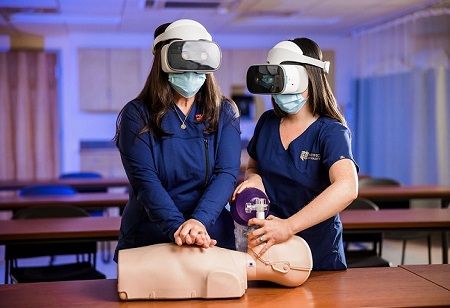A new nursing training facility has launched in India, potentially pioneering the integration of virtual reality (VR) technology. MediSim VR, a healthcare VR developer, has collaborated with Kusum Dhirajlal (KD) Hospital to establish the Virtual Reality Health Lab. Situated in Ahmedabad, Gujarat, at a 300-bed multispecialty hospital, this center offers VR simulators designed to create immersive environments for practicing medical procedures and honing clinical skills.
In an interview, Riddhi Baid, business development head at MediSim VR, shared that the training laboratory features a comprehensive, curated module library of essential skills endorsed by the Medical Council of India, the United Kingdom's General Medical Council, and the American Medical Council. "We cover essential skills required for all healthcare providers, including basic patient care skills such as assessing vital signs, proper wound care techniques, insertion of catheters, IV cannulas, and many more".
Opened in June, the VR training facility functions as a Center of Excellence focused on enhancing nursing training standards to increase efficiency, bridge skill gaps, and align training and research with industry requirements. Serving as a CoE, it offers training programs, conducts research, hosts conferences and expert sessions, facilitates international events, provides trainers' training, and delivers skills enhancement. Additionally, it offers access to VR training to nursing colleges across Gujarat.
"By integrating this state-of-the-art simulation training technology into our curriculum, we [do] not only enhance our students' learning experience but also serve as a training hub for healthcare professionals across Gujarat. As a [CoE], the MediSim VR Lab will play a significant role in upskilling nursing students", Dr Anuja Desai, executive director of KD Hospital, said in an official media release.
In January, MediSim VR and KD Hospital began their partnership to incorporate VR technology into the training curriculum at the KD Institute of Nursing. According to the Indian Nursing Council, there are approximately 3.3 million registered nurses in India, translating to a ratio of 1.96 nurses per thousand people. This figure falls short of the World Health Organization's recommended ratio of three nurses per thousand population. In addition to this shortage, there is a pressing need to train and enhance the skills of nurses, especially in rural areas where resources are scarce.
Baid believes that integrating VR into nursing education can help address this worsening issue by enhancing the quality of training and standardizing training across institutions. "Moreover, by reducing the dependency on traditional clinical placements, VR can alleviate resource constraints and accommodate larger cohorts of students". VR can also benefit learners in other areas of medical education, such as surgery and emergency medicine, in addition to nursing. According to Bair, patient education is also an area where VR can potentially provide value, helping patients understand their conditions, treatment options, and surgical procedures.

